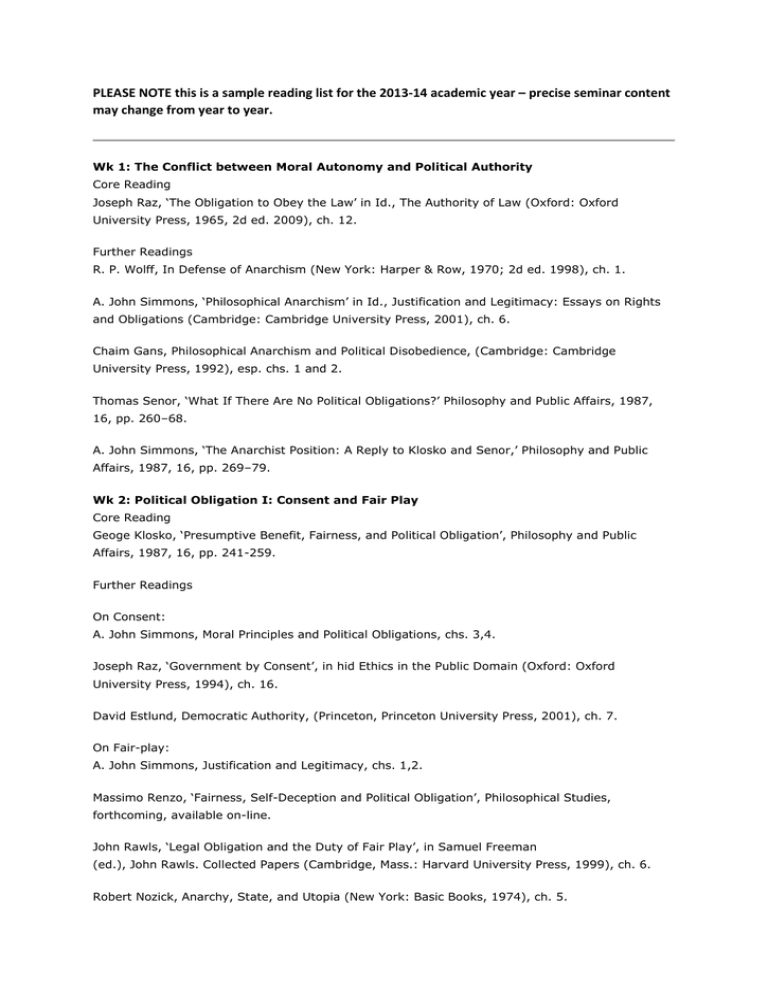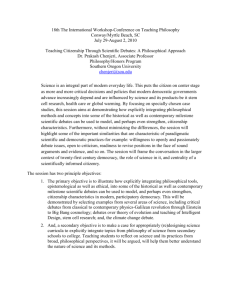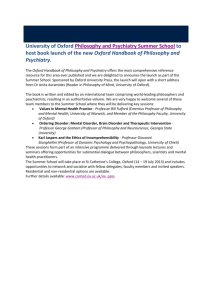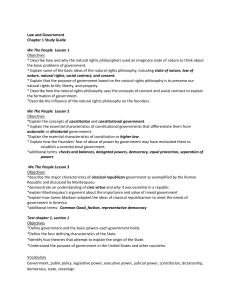PLEASE NOTE this is a sample reading list for the... may change from year to year.
advertisement

PLEASE NOTE this is a sample reading list for the 2013-14 academic year – precise seminar content may change from year to year. Wk 1: The Conflict between Moral Autonomy and Political Authority Core Reading Joseph Raz, ‘The Obligation to Obey the Law’ in Id., The Authority of Law (Oxford: Oxford University Press, 1965, 2d ed. 2009), ch. 12. Further Readings R. P. Wolff, In Defense of Anarchism (New York: Harper & Row, 1970; 2d ed. 1998), ch. 1. A. John Simmons, ‘Philosophical Anarchism’ in Id., Justification and Legitimacy: Essays on Rights and Obligations (Cambridge: Cambridge University Press, 2001), ch. 6. Chaim Gans, Philosophical Anarchism and Political Disobedience, (Cambridge: Cambridge University Press, 1992), esp. chs. 1 and 2. Thomas Senor, ‘What If There Are No Political Obligations?’ Philosophy and Public Affairs, 1987, 16, pp. 260–68. A. John Simmons, ‘The Anarchist Position: A Reply to Klosko and Senor,’ Philosophy and Public Affairs, 1987, 16, pp. 269–79. Wk 2: Political Obligation I: Consent and Fair Play Core Reading Geoge Klosko, ‘Presumptive Benefit, Fairness, and Political Obligation’, Philosophy and Public Affairs, 1987, 16, pp. 241-259. Further Readings On Consent: A. John Simmons, Moral Principles and Political Obligations, chs. 3,4. Joseph Raz, ‘Government by Consent’, in hid Ethics in the Public Domain (Oxford: Oxford University Press, 1994), ch. 16. David Estlund, Democratic Authority, (Princeton, Princeton University Press, 2001), ch. 7. On Fair-play: A. John Simmons, Justification and Legitimacy, chs. 1,2. Massimo Renzo, ‘Fairness, Self-Deception and Political Obligation’, Philosophical Studies, forthcoming, available on-line. John Rawls, ‘Legal Obligation and the Duty of Fair Play’, in Samuel Freeman (ed.), John Rawls. Collected Papers (Cambridge, Mass.: Harvard University Press, 1999), ch. 6. Robert Nozick, Anarchy, State, and Utopia (New York: Basic Books, 1974), ch. 5. Wk 3: Political Obligation II: Natural Duties and Associative Responsibilities Core Reading Christopher H. Wellman, Liberalism, Samaritanism, and Political Legitimacy, Philosophy and Public Affairs, 1996, 25, pp. 211-237. Further Readings On Natural Duty Theories: Massimo Renzo, ‘State Legitimacy and Self-Defence’, Law and Philosophy, 2011, 30, pp. 575-601. A. John Simmons, ‘Justification and Legitimacy’ in Id., Justification and Legitimacy, ch. 7. Allen Buchanan, ‘‘Political Legitimacy and Democracy’’, Ethics 2002, 112, pp. 689–719. Massimo Renzo, ‘‘Duties of Samaritanism and Political Obligation’’, Legal Theory, 2008, 14, pp. 193–217. Christopher H. Wellman and A. John Simmons, Is There a Duty to Obey the Law? (New York: Cambridge University Press, 2005), pp. 3–89. On Associative Theories: John Horton, ‘In Defense of Associative Political Obligations. Part Two,’ Political Studies, 2007, 55, pp. 1–19. John Horton, ‘In Defense of Associative Political Obligations. Part One,’ Political Studies, 2006, 54, pp. 427–43. Massimo Renzo, ‘Associative Responsibilities and Political Obligation’, Philosophical Quarterly, 2012, 62, pp. 106-127 Yael Tamir, Liberal Nationalism (Princeton, NJ: Princeton University Press, 1993), chs. 3-5. Ronald Dworkin, Law's Empire (Cambridge, MA: Harvard University Press, 1986), ch. 6. Christopher Heath Wellman, ‘Associative Allegiances and Political Obligations,’ Social Theory and Practice, 1997, 23, pp. 181–204. Wk 4: Authority and Expertise Core Reading: Joseph Raz, Between Authority and Interpretation (Oxford: Oxford University Press, 2010), ch. 5. Further Readings Joseph Raz, The Morality of Freedom (Oxford: Oxford University Press, 1986), chs. 3,4. Stephen Darwall, ‘Authority and Reasons: Exclusionary and Second-Personal’, Ethics, 2010, 120, pp. 257-278. Scott Hershovitz, ‘The Role of Authority’, Philosophers’ Imprints, 2011, 11, pp. 1–19. On practical reasoning and pre-emption: Noam Gur ‘Legal Directives in the Realm of Practical Reason: A Challenge to the Pre-emption Thesis’, American Journal of Jurisprudence, 2007, 52, pp. 159-228. Chaim Gans, ‘Mandatory Rules and Exclusionary Reasons’, Philosophia, 1986, 15, pp. 373-94. Donald H. Regan, ‘Authority and Value: Reflections on Raz’s Morality of Freedom,’ Southern California Law Review, 1989, 62, 995-1096. Stephen R. Perry, ‘Second-Order Reasons, Uncertainty and Legal Theory,’ Southern California Law Review, 1989, 62, pp. 913-94. Michael S. Moore, ‘Authority, Law, and Razian Reasons,’ Southern California Law Review, 1989, 62, pp. 827-96. Larry Alexander, ‘Law and Exclusionary Reasons,’ Philosophical Topics, 1990, pp. 5-22. Wk 5: Territorial Rights Core Reading: Anna Stiltz, ‘Nations, States, and Territory’, Ethics, 2011, 121, pp. 572–601. Further Readings Lea Ypi, ‘Territorial Rights and Exclusion’, Philosophy Compass, 2013, 8, pp. 241-253. David Miller, ‘Territorial Rights: Concept and Justification’, Political Studies, 2011, 60, pp. 252– 268. Cara Nine, ‘A Lockean theory of territory’, Political Studies, 2008, 56, pp. 148–165. John Simmons ‘On the territorial rights of states’, Philosophical Issues, 2001, 11, pp. 300–326. Lea Ypi, ‘A Permissive Theory of Territorial Rights’. The European Journal of Philosophy, available online. Wk 6: Reading week *** Wk 7: The Instrumental Value of Democracy Core Reading: Richard Arneson, ‘Democratic Rights at National and Workplace Level’ in David Copp, Jean Hampton and John Roemer, The Idea of Democracy (New York: Cambridge University Press, 1993), pp. 118-38; reprinted in Thomas Christiano (ed.), Philosophy and Democracy (New York, Oxford University Press, 2003), ch.4. Further Readings: Christopher Griffin, ‘Democracy as a Non-Instrumentally Just Procedure’, Journal of Political Philosophy, 2003, 11, pp. 111-22. Richard Arneson, ‘Democracy is Not Intrinsically Just.’ In Dowding, Keith, Goodin, Robert, and Pateman, Carole (eds.). Justice and Democracy (Cambridge: Cambridge University Press, 2004), pp. 40-58. Richard Arneson, ‘Defending the Purely Instrumental Account of Democratic Legitimacy.’ Journal of Political Philosophy, 2003, 11, pp. 122-32. Copp, David. ‘Could Political Truth be a Hazard for Democracy?’ In Copp, Hampton, and Roemer (eds.) The Idea of Democracy. Wk 8: The Non-instrumental Value of Democracy Core Reading: Joshua Cohen, ‘Procedure and Substance in Deliberative Democracy’, in his Philosophy, Politics, Democracy. Selected Essays (Cambridge, Mass.: Harvard UniversityPress, 2009), ch. 5; reprinted in Christiano (ed.), Philosophy and Democracy, ch.1. Further Readings: David Estlund, ‘Beyond Fairness and Deliberation: The Epistemic Dimension of Democratic Authority’, in Christiano (ed.), Philosophy and Democracy, ch. 3. Thomas Christiano, ‘The Authority of Democracy’, The Journal of Political Philosophy, 2004, 12, pp. 266 – 90. Fabienne Peter, Democratic Legitimacy (New York: Routledge, 2008),especially chs. 6, 7. David Estlund, Democratic Authority (Princeton: Princeton University Press, 2008), chs. 2-4 Thomas Christiano, The Constitution of Democracy (Oxford: Oxford University Press, 2008). Elizabeth Anderson, ‘Democracy: Instrumental vs Non-Instrumental Value’, in Thomas Christiano and John Christman (eds.), Contemporary Debates in Political Philosophy (Malden, MA: Blackwell, 2009), pp. 212-27. Wk 9: Self-Determination Core Reading: Altman and Wellman, A Liberal Theory of International Justice (Oxford: Oxford University Press, 2011), ch. 2 Further Readings: Jean-Jacques Rousseau, The Social Contract, Book I and II, chapters i-v. M. Walzer, ‘The Moral Standing of States’, Philosophy and Public Affairs, 9 (1980); reprinted in Id., Thinking Politically. Essays in Political Theory, D. Miller ed. (New Haven: Yale University Press, 1985), ch. 13. Beitz, C. (1973), ‘The Autonomy of States’, in Id. Political Theory and International Relations (Princeton: Princeton University Press), pp. 67-123. Allen Buchanan, Justice, Legitimacy, and Self-Determination: Moral Foundations for International Law, (Oxford: Oxford University Press, 2007), part III. C.H. Wellman, ‘Taking Human Rights Seriously’, Journal of Political Philosophy, 2012, 20, pp. 11930. Daniel Philpott, ‘In Defense of Self-Determination’, Ethics, 1995, 105, pp. 352-385 Wk 10: The Ethics of Voting Core Reading: Jason Brennan, ‘The Right to a Competent Electorate’, The Philosophical Quarterly, 2011, 245, pp. 700–724. Further Readings: Geoffrey Brennan and Loren Lomaski, ‘Toward a Democratic Morality’, in David Estlund (ed.), Democracy (Malden, MA: Blackwell, 2001), pp. 327-66 JS Mill, Considerations on Representative Government, chs. 6-7-8 Jason Brennan, The Ethics of Voting (Princeton: Princeton University Press, 2011). Kasper Lippert-Rasmussen, ‘Vote Buying and Election Promises: Should Democrats Care About the Difference?’, Journal of Political Philosophy, 2011, 19, pp. 125-144. Nathan Hanna, ‘An argument for voting abstention’, Public Affairs Quarterly 2009, 23, pp. 279286. Alvin Goldman, ‘A Causal Responsibility Approach to Voting’, in Estlund (ed.), Democracy, pp. 26786 Other sources Introductions: A. John Simmons, Moral Principles and Political Obligations (Princeton: Princeton University Press, 1979). John Horton, Political Obligation (London: MacMillan, 2d. ed. 2010). Dudley Knowles, Political Obligation: A Critical Introduction (London and New York: Routledge, 2010). Leslie Green, The Authority of the State (Oxford: Oxford University Press, 1988). Dorota Mokrosinska, Rethinking Political Obligation, (London: Palgrave, 2012). Thomas Christiano, The Rule of the Many: Fundamental Issues in Democratic Theory (Boulder, Co.: Westview Press, 1996). Fabienne Peter, Democratic Legitimacy (New York: Routledge, 2008) Charles Beitz, Political Equality: An Essay in Democratic Theory (Princeton: Princeton University Press, 1990) Encyclopedia Entries Scott Shapiro, ‘Authority,’ in Jules Coleman and Scott Shapiro (eds.), The Oxford Handbook of Jurisprudence and Philosophy of Law (Oxford: Oxford University Press, 2002). Leslie Green, ‘Legal Obligation and Authority’, The Stanford Encyclopedia of Philosophy (Spring 2010 Edition), Edward N. Zalta (ed.)http://plato.stanford.edu/archives/spr2010/entries/legalobligation/ . Tom Christiano, ‘Authority’, The Stanford Encyclopedia of Philosophy (Spring 2012 Edition), Edward N. Zalta (ed.), URL = <http://plato.stanford.edu/archives/spr2012/entries/authority/>. Fabienne Peter, ‘Political Legitimacy’, The Stanford Encyclopedia of Philosophy (Summer 2010 Edition), Edward N. Zalta (ed.), URL = <http://plato.stanford.edu/archives/sum2010/entries/legitimacy/ Richard Dagger, ‘Political Obligation’, The Stanford Encyclopedia of Philosophy (Summer 2010 Edition), Edward N. Zalta (ed.), URL = <http://plato.stanford.edu/archives/sum2010/entries/political-obligation/>. Tom, Christiano, ‘Democracy’, The Stanford Encyclopedia of Philosophy (Fall 2008 Edition), Edward N. Zalta (ed.), URL = <http://plato.stanford.edu/archives/fall2008/entries/democracy/>. Collections: W. A. Edmundson (ed.), The Duty to Obey the Law (Lanham, MD: Rowman & Littlefield, 1999). J. T. Sanders and J. Narveson (eds.), For and Against the State, (Lanham, MD: Rowman and Littlefield, 1997). Thomas Christiano (ed.), Philosophy and Democracy (New York, Oxford University Press, 2003). David Estlund (ed.), Democracy (Malden, MA: Blackwell, 2001). Joseph Raz (ed.), Authority (Oxford: Oxford University Press, )




